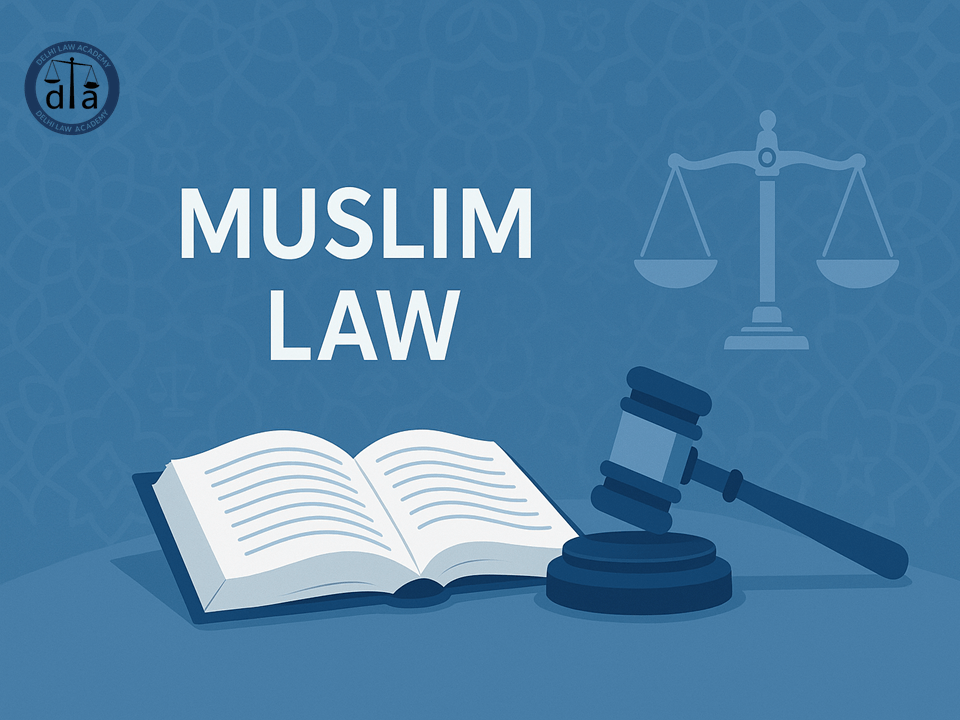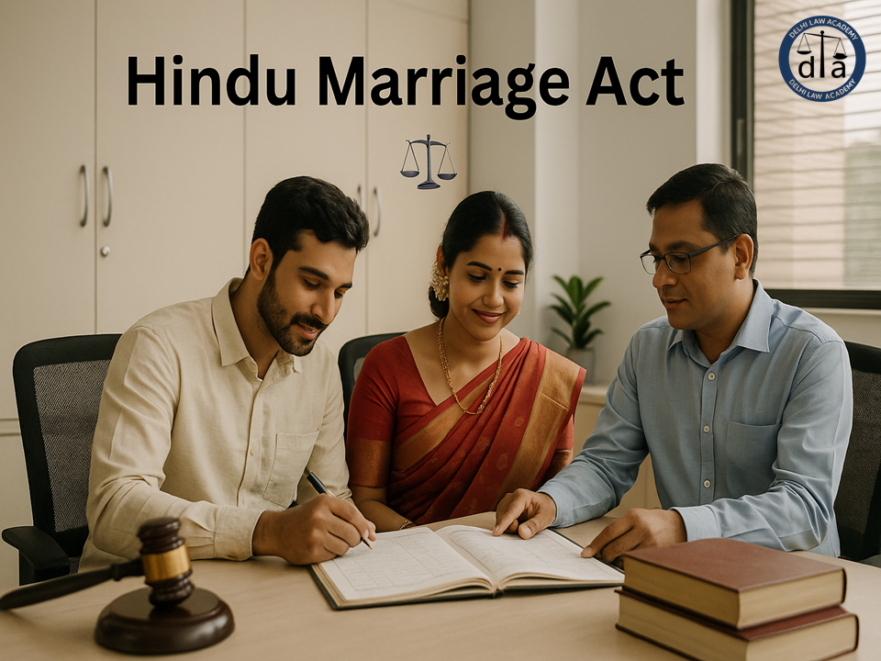
⚖️ Preparation for RJS, DJS, PCS (J) and other Judicial Service Exams
📚 GHULAM KUBRA BIBI v. MOHAMMAD SHAFI [1940 PESH]
• “According to Mahomedan law, it is absolutely necessary that the man or someone on his behalf and the woman or someone on her behalf should agree to the marriage at one meeting, and the agreement should be witnessed by two adult witnesses.”
• “According to Mahomedan law a girl becomes major for the purposes of marriage when she reaches the age of puberty, which is presumed to be the age of 15 years.”
Muslim Law is an important component of most Judicial Service exams in the country. Its thorough knowledge is a must for all aspirants of RJS, DJS, PCS (J) and other Judicial Service exams. To help such aspirants, DELHI LAW ACADEMY JAIPUR has launched a series of study material modules on all important aspects of this important part of their syllabus:
🕌 Ghulam Kubra Bibi v. Mohammad Shafi [1940 Pesh]
Mohammad Shafi sued Mt. Ghulam Kubra for restitution of conjugal rights. He also impleaded her parents and asked that an injunction should be issued against them to restrain them from interfering in his marital relations with his wife. The defence taken by Mt. Ghulam Kubra was that she was never married to Mohammad Shafi. There was also a question whether the woman was of age at the time when she was married.
The Mullah appeared and he said that he read the nikah at the instance of the grandfather of the girl. He categorically denied that anyone was sent to the girl to enquire from her whether she agreed to the marriage. Two witnesses were produced who alleged that they were the witnesses of the nikah. They were again laconic, because they stopped at that, and did not give any detail as to what was done by them.
The trial Judge held that the girl was of age when she was married. He was of the view that the marriage had been proved. He, therefore, granted a decree as prayed for against all the defendants. An appeal was preferred to the District Court. It was admitted by both the parties before the learned Additional Judge that the girl was of age when the marriage was held. The Judge maintained the decree for restitution of conjugal rights. But he did not think it necessary to issue an injunction to the parents of the girl. He, therefore, accepted the appeal to this extent that he set aside the portion of the order relating to injunction. Mt. Ghulam Kubra has come upon further appeal to this Court against the decree granting restitution of conjugal rights.
According to Mahomedan law, it is absolutely necessary that the man or someone on his behalf and the woman or someone on her behalf should agree to the marriage at one meeting, and the agreement should be witnessed by two adult witnesses. As women are in pardah in this part of the country it is customary to send a relation of the woman to her inside the house accompanied by two witnesses. The relation asks the girl within the hearing of the witnesses whether she authorizes him to agree to the marriage on her behalf for the dower money offered by the husband. He explains to her the detail of the dower proposed. When the girl says “yes” or signifies her consent by some other method, the three persons come out. The future husband and those three persons are then placed before the Mullah. The Mullah asks the boy whether he offers to marry the girl on payment of the specified dower. He says “yes”. Then the relation, who had gone inside, tells the Mullah that he is the agent of the girl. The Mullah asks him whether he agrees to the marriage on payment of the specified dower. The relation says “yes”. The witnesses are present there so that if the Mullah has any doubt he should question them as to whether the relation is a duly authorized agent of the girl. Directly both sides have said “yes” the Mullah reads the scriptures and the marriage is complete.
I have been at pains to describe the method which is usually adopted in this part of the country for effecting a marriage in order to show that the vague allegation that there were two witnesses of the nikah has no value and that it should be proved that the whole procedure has been gone through: in particular when the man who read the nikah is positive that no one was sent to the girl to enquire from her whether she was a willing party. It is on the record that the girl was 17 years of age when her marriage was solemnised. It appears that the parties did not know then that according to Mahomedan law a girl becomes major for the purposes of marriage when she reaches the age of puberty, which is presumed to be the age of 15 years. I think they were under the impression that she could not be major up to 18 years of age, as is the general law, and I guess that the girl was, therefore, given away by the grandfather and not personally consulted. For when a girl is minor it is permissible in Mahomedan law that her father or grandfather or other paternal relations should give her away. The marriage is valid and is called a nikah all the same.
It is interesting in this connection to point out that such nikah also requires two adult witnesses. The witnesses produced in this case have only said that they were the witnesses of the nikah; who knows whether they were not the witnesses of the giving away of the girl by the grandfather. For the reasons given above I hold that no valid marriage has taken place in this case, and that the plaintiff has, therefore, no right to sue for restitution of conjugal rights.
The appeal of Mt. Ghulam Kubra is accepted and the suit of Mohammad Shafi is dismissed with costs throughout. The appeal of Mohammad Shafi is dismissed.
* * * * *
📚 Continue Your Muslim Law Preparation
Don’t stop here! Strengthen your knowledge of Muslim Law with our blogs:
📘 Free Study Material for Judiciary Aspirants!
Download our FREE study material prepared by Delhi Law Academy’s expert faculty.
📝 FAQs on Muslim Marriage and Nikah Procedures
According to Mahomedan law, a girl is considered major for marriage purposes when she reaches puberty, which is presumed to be 15 years of age. (Ghulam Kubra Bibi v. Mohammad Shafi, 1940)
For a valid Nikah, it is necessary that the man (or his representative) and the woman (or her representative) agree to the marriage in a single meeting, and the agreement should be witnessed by two adult witnesses. Consent of the girl is essential unless she is a minor and a guardian gives consent on her behalf.
Yes. If the girl is a minor (below the age of puberty), her father, grandfather, or other paternal relation may give her away for marriage. The marriage is still valid and is recognized as a Nikah under Mahomedan law.
Witnesses ensure that both parties or their representatives have agreed to the marriage. They are required to observe that the consent is properly given and the Mullah or officiant reads the Nikah according to procedure. Without valid witnesses, the Nikah can be challenged.
Yes, unless she is a minor. Adult girls must give explicit consent, either verbally or by other accepted signs, which is confirmed by the witnesses and the Mullah. This ensures the marriage is free from coercion and legally valid.
If the proper Nikah procedure is not followed — e.g., lack of valid witnesses or missing consent — the marriage can be declared invalid, and claims like restitution of conjugal rights cannot be enforced. (Ghulam Kubra Bibi v. Mohammad Shafi, 1940)
Contact us
📍 Delhi Law Academy – Jaipur Branch
6C, Tower 2, Coaching Hub, Pratap Nagar, Jaipur – 302033
📞 Phone:
+91 9911916552
+91 8447285606
✉️ Email:
contactus@delhilawacademy.com

